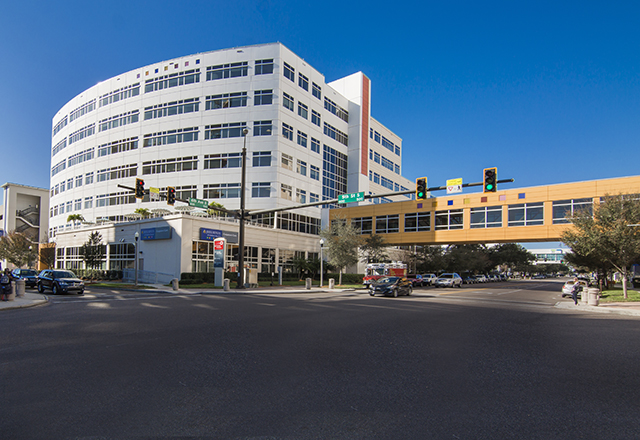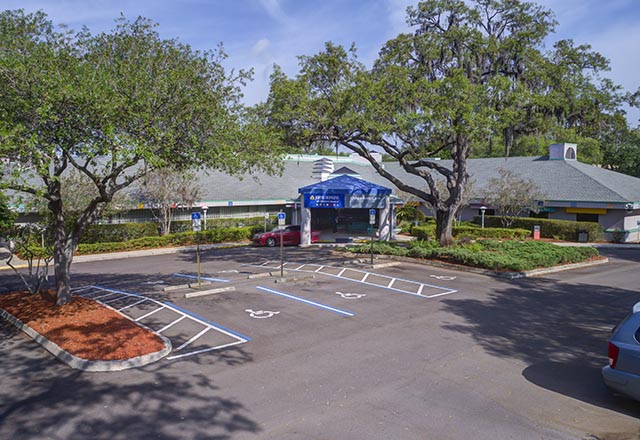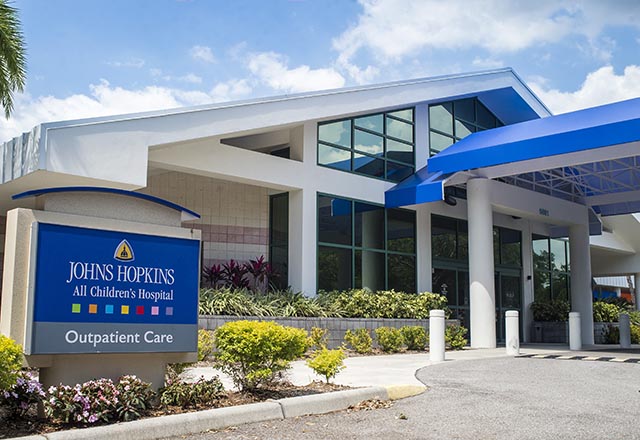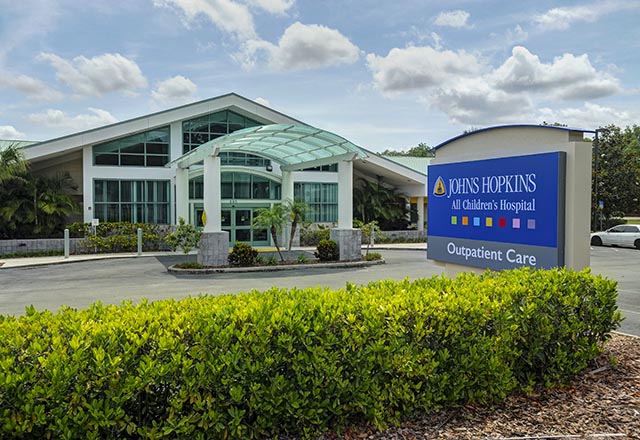Cleft Lip and Palate Surgery at Johns Hopkins All Children's
Cleft lip and palate is the most common birth defect in the United States. It results from a failure of the bones and tissues that form the nose, lip, and roof of the mouth to fuse during development. Children may be born with clefts that affect their lip, palate or both. Each child’s treatment is tailored to their specific type of cleft to give them the best appearance and functional outcome.
Why Choose Johns Hopkins All Children’s
Cleft lip or palate can impact a child in several ways, causing feeding issues, ear and hearing issues, speech and language delay, and dental problems. Our team in the Cleft and Craniofacial Program at Johns Hopkins All Children's Hospital in St. Petersburg, Florida, is comprised of experts in these areas who work together to provide an individualized treatment plan for each child.
The team includes pediatric plastic and reconstructive surgeons; pediatric ear, nose and throat specialists; audiologists; speech-language and feeding therapists; and pediatric dentistry and orthodontics specialists. Learn more about the cleft and craniofacial team.
Some patients carry a genetic factor or have a syndrome that places them at higher risk for the condition, but the majority of cleft patients do not have one of these conditions. These cases likely result from a unique interaction between the patient’s genes and the environment. Families who previously had a family member with a cleft are at a very small increased risk of having another baby with a cleft. Our cleft team will perform a thorough evaluation of your child and family to give you more helpful information about this condition
Our Cleft and Craniofacial Program is also approved as a Cleft Palate Team and Craniofacial Team by the Commission on Approval of Teams, which ensures cleft and craniofacial teams meet the Standards for Cleft Palate and Craniofacial Teams as set by the American Cleft Palate-Craniofacial Association and Cleft Palate Foundation.
Cleft Lip and Palate: Sapphira's Story
Surgery and treatment have helped baby Sapphira and her family overcome feeding challenges and other issues from a cleft lip and palate. And Sapphira’s smile, her mother says, is contagious. Read Sapphira's story.


Watch and be inspired by Harper's story:
When Melissa and Creighton were looking for care for their baby who would be born with cleft lip — a condition Melissa had also been treated for as a child — they found the expert, compassionate team they were seeking at Johns Hopkins All Children’s. Learn how the cleft and craniofacial team helps patients like baby Harper.
Our Approach to Cleft Lip and Palate Surgery and Care
Cleft lip and cleft palate are both repaired with a surgical procedure performed by your child's plastic surgeon, with cleft lip surgery usually performed first. Cleft lip and cleft palate surgery are both performed at Johns Hopkins All Children's Hospital with our team of dedicated pediatric anesthesiologists. Most patients remain in the hospital for one to two days.
-
Treatment of cleft lip and palate requires a team of specialists. We have a well-established team that meets regularly to provide care for these patients. Cleft patients are usually seen in one of these “team” clinics every one to two years to coordinate all phases of their care from birth until they graduate to adulthood. During a team visit, you will see your plastic surgeon, an ENT specialist, a pediatrician, an audiologist, a speech/feeding expert, a pediatric dentist, an orthodontist, and our social worker. At different phases of your child’s development, they may need more focused treatment from one of these specialties, and they will be seen more frequently by the appropriate expert. In addition to the obvious facial differences, other issues related to the cleft may require treatment or education from our team.
Feeding issues
Infants with clefts often have difficulty sucking effectively, and it is not uncommon for them to have difficulty or to be unable to breast feed. Typically, infants with clefts require specialized bottles to feed effectively. Our feeding specialists will teach you how to feed your baby so they can grow.
Ear and hearing issues
Our audiology and ENT specialists will address any needs related to ear and hearing issues. Ear infections and fluid accumulation in the ears is common in cleft patients, which can cause long lasting hearing loss and difficulty learning to speak. To prevent this, most patients with cleft palates require ear tubes.
Speech and language delay
Due to the cleft, the muscles of the palate do not always function properly, which may prevent your child from making specific sounds needed for normal speech. This is often correctable with therapy, but occasionally requires a surgical procedure to correct the problem. Our speech therapists and surgeons work closely together to identify patients who would benefit from these treatments.
Dental problems
Dental anomalies are common in cleft patients, and cleft patients are at increased risk for cavities and most benefit from braces. We have pediatric dentists and orthodontists on our team to assist you with getting your child the care they need.
-
In children with more severe clefts, work may be necessary to prepare them for the best outcome. Often this involves the use of a modified Latham device that will decrease the width of the cleft and allow the surgeon to achieve the best result.
If your child is a candidate for the Latham device, we will take a molded impression of his or her mouth, create a device specifically for your child, and place the device in the operating room. Our plastic surgeon and orthodontists will teach you to care for this device before surgery. A secondary lip or nose surgery may be needed as your child grows, and most cleft patients benefit from a final nose surgery, or rhinoplasty, after they are done growing.
-
Your child will likely be irritable following surgery. They will be prescribed medications to help with this. Your child may have to wear padded arm restraints to prevent them from placing their hands in their mouth and injuring their surgical site.
Your child may have dissolving stitches or stitches that will be removed five to seven days after surgery. Your surgeon will discuss this with you. It is normal to have swelling, bruising, and blood around the incisions. The lip scar will gradually fade with time, but will never completely disappear.
You will be given instructions on feeding your child after surgery. Your child will likely require pain medications after surgery. After two to three days, your child will feel more comfortable and should only require non-aspirin pain medications, which can be discontinued after a few additional days.
-
Cleft palate surgery is more involved than lip surgery and often patients have greater discomfort afterward. As a result, patients do not eat or drink as usual for two to three days after surgery, and will have an intravenous (IV) catheter to allow us to give them pain medications and fluids until they are drinking sufficient liquids.
Your child will have stitches in the palate that will dissolve on their own, and may have to wear padded arm restraints to prevent them from placing their hands in their mouth and injuring their surgical site.
Your child may have a stitch in their tongue or a tube in their nose after surgery. This is in case they develop a swollen tongue after surgery. If their swelling is minimal, this will be removed the day after surgery. There may be bloody drainage from the nose and mouth after surgery. This will decrease in one to two days. Many infants have nasal congestion after surgery. Signs of this include snorting, mouth breathing, and decreased appetite.
A small amount of water should be offered after every bottle or meal to cleanse the incision. You should rinse the incision gently several times a day to keep it clean from food or debris. Your child may stay in the hospital for one to three days depending on their feeding after surgery. They will be discharged home with a prescription for pain medication.
Your plastic surgeon may want your child to eat a soft diet for up to four weeks after surgery. Breast milk and formula are fine to drink after surgery. For older children, appropriate foods include baby foods, popsicles, yogurt, mashed potatoes, gelatin and other foods of similar consistencies.
Contact Us
Questions?
We know that you want the best possible care for your child. Our team is here to assist you with your questions. Call 727-767-2930.

Request an Appointment
Complete our online form and select "Pediatric Plastic Surgery." A member of our team will contact you.

-
Outpatient Care Center
Johns Hopkins All Children's Hospital 601 5th Street South, St. Petersburg, FL 33701

-
Johns Hopkins All Children's Outpatient Care
Tampa 12220 Bruce B Downs Blvd., Tampa, FL 33612

-
Johns Hopkins All Children's Outpatient Care
Sarasota 5881 Rand Blvd., Sarasota, FL 34238

-
Johns Hopkins All Children's Outpatient Care
Brandon 885 South Parsons Avenue, Brandon, FL 33511



